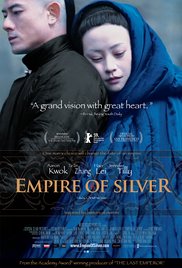
EMPIRE OF SILVER
China, 2010, 113 minutes, Colour.
Aaron Kwok, Tielen Zhang, Jennifer Tilly.
Directed by Christina Yao
There are so many films from China in recent years which take us back into more recent history – after such a spate of films about the military history of China in the various kingdoms in previous millennia.
Empire of Silver goes back only a century or more (as have films about the centenary of the downfall of the empire in 1911). It opens in the provinces with a voiceover narrative from a descendant of the protagonists who reminisces from the 20th century vantage point and elaborates what he sees as the final achievement of his family, a family of bankers.
As with the other films, the audience will feel that they have been immersed in this Chinese world, the action, the colour, the dangers, the costumes, the disparity between the poor and the rich.
Western audiences not familiar with the events will need to pay attention since the film often moves rapidly, passing sometimes over a year or more at a time. We have to try to work out who is who in the family, especially when the narrative goes into flashback. That having been said, it is clear that this is the story of a banking patriarch at the end of the 19th century, the status of banking at the time – and the Boxer rebellion. The patriarch’s oldest son is a kindly deaf mute who tries to feed the hungry. The second son is a harsh and brutal dominator. The third son is a dilettante, not esteemed by his father. The fourth son is more hopeful but when his new wife is abducted, he collapses mentally. The branch managers in Beijing and Shanghai are much better administrators.
Along with this plotline, there is a romantic plot, the third son in love with a young woman who has become another wife for his father. These lines run parallel for a while but eventually come together when the third son is sent to Mongolia (magnificent photography of the Gobi desert, of the mountains and a rather electrifying encounter with ravenous wolves, even though they are clearly animatronic). He returns for the funeral of the wife and accepts the commission from his father to manage the bank, especially in the hiding and hoarding of silver until the crisis is over.
The third son thus comes into his own, setting up a banking system for the poor, managing the banks well – and over some decades until after World War II.
The overall effect is impressive but the development seems patchy at times, many sequences (like that with the wolves) standing out while others play more conventionally.
(Western audiences are part of the target audience. Jeremy Thomas (who produced the Oscar-winning The Last Emperor) produced this and a number of films in China, including 13 Assassins. This one has a featured role for Jennifer Tilly.)
1. An interesting piece of Chinese history? The end of the 19th century? The opening of the 20th? The background of the Boxer Rebellion? The later nationalist revolt? Shaping China until the Communist takeover?
2. The recreation of the period, the Chinese city, the wealthy family, the lifestyle, the banks, the bank managers assembling for an annual meeting and the abacus? The historical and social background? The banking system? The Boxer Rebellion? Costumes and decor? The musical score?
3. Adaptation from novels, the Taiwanese director?
4. The voice-over, the perspective of the late 20th century, 21st century? Appreciation of what had happened?
5. The film as spectacle, as drama, romance, financial dealings?
6. The 19th century, Chinese finance, the equivalent of Wall Street? The powerful bankers, the managers? The inheritance? The management of money during rebellions?
7. The patriarch of the family, Kang, his skills in banking, his control of the managers, summoning meetings? His relationships, his wives?
8. The four sons, the older and his lack of drive, the second and his arrogance, the third and his wastrel kind of life, the fourth and the abduction of his wife and his emotional collapse?
9. The Third Master, as a person, his life, dilettante, wastrel, his love for the young woman – and his father taking her and marrying her? His unwillingness to take over the banking system?
10. The abduction of his brother’s wife, the repercussions, the Third Master and his deciding to take on responsibilities, the clashes with his father?
11. His love for the young woman, her becoming his stepmother, her education, teaching him English, her death and the funeral?
12. His going into exile, in the Gobi desert, the experience of isolation, the episode with the wolves? His return?
13. The Western connections, especially with the Western missionary?
14. The Third Master and his achievement with finance and the banks – and admiration from later generations?